|
|
|
Sort Order |
|
|
|
Items / Page
|
|
|
|
|
|
|
| Srl | Item |
| 1 |
ID:
136770


|
|
|
|
|
| Summary/Abstract |
The author gives his view on China’s response to the events unfolding in Ukraine, and looks at the economic and geopolitical reasons behind China’s concern over the Ukrainian crisis.
|
|
|
|
|
|
|
|
|
|
|
|
|
|
|
|
| 2 |
ID:
136791
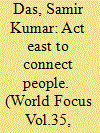

|
|
|
|
|
| Summary/Abstract |
As India marched into the new millennium with her renewed emphasis on what had come to be known as her 'Look East policy' being followed since the early 1990s, the Northeast appears to have been poised for a great leap forward. The region - being the key strategic node through which India can Look East farther towards the countries of Southeast Asia and eventually of East Asia - is no longer considered as 'a cul-de-sac leading nowhere', but as Verghese puts it, “a gateway to lands and opportunities beyond”.
|
|
|
|
|
|
|
|
|
|
|
|
|
|
|
|
| 3 |
ID:
135401


|
|
|
|
|
| Summary/Abstract |
Amid the buzz around new US and EU sanctions being imposed on Russia, sanctions on another country, on the other side of the world, were being gently lifted. In October, following elections, America and Australia removed all remaining sanctions on Fiji, which had included travel bans for top officials, an embargo on arms sales and limits on financial assistance.
The sanctions can be at least partly credited for holding President Frank Bainimarama, the retired rear admiral who seized power in a bloodless 2006 coup, to his promise of holding elections in 2014, albeit having failed to persuade him to move the timetable forward.
|
|
|
|
|
|
|
|
|
|
|
|
|
|
|
|
| 4 |
ID:
135317


|
|
|
|
|
| Summary/Abstract |
This paper evaluates the debate over whether China’s emergence as an economic superpower has been a complement or threat to ASEAN by examining data in the eleven years following China’s accession to the WTO. Employing a qualitative approach, it seeks to understand whether China’s growing dominance has hindered ASEAN GDP growth, exports and attractiveness as a destination for FDI. The evidence suggests that China’s rise has caused a shift in global trade patterns, with China dominating Western markets at the expense of ASEAN countries. Despite this, China’s dominance does not appear to have had a significant negative effect on growth rates for ASEAN GDP, exports, or FDI stocks. Given this, the paper concludes that while China is crowding ASEAN out of Western markets, increased Chinese demand for ASEAN imports has more than offset this effect. The result is that ASEAN exports and GDP have grown despite shifting trade patterns in the short run.
|
|
|
|
|
|
|
|
|
|
|
|
|
|
|
|
| 5 |
ID:
136549
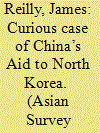

|
|
|
|
|
| Summary/Abstract |
Nowhere is China’s aid program both more important and yet less understood than with North Korea. This article examines two puzzles: China’s aid to North Korea coexists with a discriminatory trading relationship, and China continues to provide aid even as it tightens economic sanctions on North Korea’s nuclear program.
|
|
|
|
|
|
|
|
|
|
|
|
|
|
|
|
| 6 |
ID:
134762


|
|
|
|
|
| Summary/Abstract |
China’s engagement in Africa is an increasingly popular topic in the 21st century. However, not much attention has been paid in the field of education and little evidence can be seen in what actually happens on the ground. This article aims to explore China’s educational aid to Africa, from both textual and fieldwork sources. It will focus on three parts: first, the existing recognition of Chinese distinctions in foreign aid and China’s donor logic based on “win-win” strategies; second, an argument that China’s donor logic in educational aid might be informed by producing soft power through “public diplomacy”; third, a discussion of people’s perception collected in Tanzania, including voices from officials and returning African students. The article will take China’s main educational approach, the Government Scholarship Scheme as an example, and look at how this educational practice has been processed in a “diplomatic” way. It is concluded that China’s educational aid and its features in practice, based upon diplomatic policies and China’s distinctive donor logic of foreign aid, is serving bilateral relations rather than orthodox aid relations. If quality transformation and communication can be maintained in the Chinese universities, education would contribute to a lasting and cooperative relationship between China and Africa. It may add more complexities to “soft power” within broader conceptions under the contemporary global political economy.
|
|
|
|
|
|
|
|
|
|
|
|
|
|
|
|
| 7 |
ID:
137064


|
|
|
|
|
| Summary/Abstract |
Donors often condition foreign aid to recipients on policy adjustments. How do domestic interest groups influence a donor’s ability to credibly commit to implementing threats and promises? In our model, domestic interest groups in the donor country can mobilize to support the donor’s implementation of punishments and rewards. The expectation of such mobilization influences the credibility of threats and promises at the prior contracting stage. The analysis produces three central findings. First, the donor chooses to rely on a single instrument when the domestic interest group exhibits a strong preference for that instrument, even if the cost of using that instrument is relatively high. Second, for credibility reasons the donor often promises generous rewards or threatens ruthless sanctions that seem out of proportion. Finally, the donor cannot simultaneously make credible threats and promises unless domestic interest groups mobilize to support both instruments. We examine the case of US foreign aid to Israel and Palestine to illustrate these theoretical propositions.
|
|
|
|
|
|
|
|
|
|
|
|
|
|
|
|
| 8 |
ID:
135059
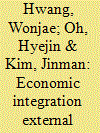

|
|
|
|
|
| Summary/Abstract |
Purpose—This study examines whether economic integration between South and North Korea has promoted political cooperation and whether external forces are still a dominant factor in explaining their behavior. Design/methodology/approach—This study is based on a quantitative analysis of roll call data in the United Nations General Assembly (UNGA) between 1991 and 2011. Vote coincidence between South and North Korea is examined. Findings—Empirical results show that economic integration does not generate significant effects on cooperation between the two Koreas, while their vote coincidence is strongly influenced by the political positions of the U.S. and China. Meanwhile, the two Korea’s tend to agree on economic issues but show dissimilar voting patterns over nuclear, security, and human rights issues.
Practical implication’s—The findings imply that economic and humanitarian cooperation between South and North Korea cannot be easily transferred to political cooperation in other areas without drawing support from powers such as the U.S. of economic integration on cooperation, efforts to reduce the North’s security concerns resulting from asymmetric dependence need to be followed.
|
|
|
|
|
|
|
|
|
|
|
|
|
|
|
|
| 9 |
ID:
135319


|
|
|
|
|
| Summary/Abstract |
This paper examines changes in the location of economic activity in Cambodia between 1998 and 2008 in terms of employment growth. During this period, Cambodia joined ASEAN and increased trade with its neighbouring countries. Drawing on theoretical predictions made by New Economic Geography (NEG), we focus on frontier regions such as border areas and international port cities, and examine the changing state of manufacturing in Cambodia. Our results suggest that economic integration and concomitant trade linkages may lead to the industrial development of Cambodia’s frontier regions and metropolitan areas.
|
|
|
|
|
|
|
|
|
|
|
|
|
|
|
|
| 10 |
ID:
135284
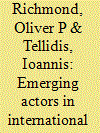

|
|
|
|
|
| Summary/Abstract |
Emerging actors in peacebuilding are generating a slow transformation of the norms and praxes of international peacebuilding, statebuilding, and development. Although each of the emerging donors have different contexts, approaches, motives, and methodologies, their power, influence, and—crucially— their nonadherence to the principles of the Development Assistance Committee of the Organisation for Economic Co-operation and Development have attracted scepticism and criticism from traditional donors. This article highlights the nuances of donors' engagement with peacebuilding and statebuilding. It examines whether they are critical or status quo states and what the implications are for practices of intervention.
|
|
|
|
|
|
|
|
|
|
|
|
|
|
|
|
| 11 |
ID:
136961


|
|
|
|
|
| Summary/Abstract |
The purpose of this paper is to analyze the defense interdependence between Japan and the United States (US) in the short and long run and to investigate whether Japan is a follower or a free rider of the “US” over the 1975–2009 period. Given that mutual aid between Japan and the US has been maintained, the empirical results suggest that Japanese defense has a stable relationship with US defense. Furthermore, the results reveal that Japan is not a free rider but rather a follower in the period under consideration.
|
|
|
|
|
|
|
|
|
|
|
|
|
|
|
|
| 12 |
ID:
135079
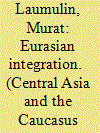

|
|
|
|
|
| Summary/Abstract |
Eurasian integration and the Eurasian Economic Union have attracted numerous views and opinions and ignited heated discussions: a larger part of the political and business community of the CIS countries is aware of the advantages a common economic space that has their best interests at heart will have to offer. On the other hand, the possible loss of national sovereignties and independence has stirred up apprehension that keeps politicians in two minds and slows down economic cooperation.
|
|
|
|
|
|
|
|
|
|
|
|
|
|
|
|
| 13 |
ID:
135751


|
|
|
|
|
| Summary/Abstract |
The northwestern Chinese region of Xinjiang is experiencing ongoing violent unrest but remains an economic gateway to Eurasia. Sarah Lain examines China’s policy to improve security and economic cooperation with its central Asian neighbours.
|
|
|
|
|
|
|
|
|
|
|
|
|
|
|
|
| 14 |
ID:
135318


|
|
|
|
|
| Summary/Abstract |
Using an unbalanced panel dataset of bilateral trade flows, we study the determinants of two-way trade for Australia, China, India, Japan, New Zealand, Korea and the ten ASEAN countries from 1990 to 2009. We find that bilateral trade flow is positively related to the sum of the GDP of trading countries, and similarity in GDP size, but inversely related to relative factor endowment differences, transportation costs and import tariffs. Our empirical results suggest that formulating an East Asian Free Trade Area is important for promoting intraregional trade. Furthermore, there is a need to provide a range of instruments to assist least-developed ASEAN countries in designing and implementing appropriate trade integration policies through the provision of technical and financial assistance as well as analytical support.
|
|
|
|
|
|
|
|
|
|
|
|
|
|
|
|
| 15 |
ID:
135154


|
|
|
|
|
| Summary/Abstract |
Despite long historical ties, post-colonial relations between India and Myanmar have fluctuated between magnanimity and mistrust. While India often stood for high moral grounds and promotion of democracy, it did so at the cost of losing Myanmar to China. This affected both India and Myanmar adversely: while New Delhi’s economic, energy and security interests were hurt, isolated Yangon became more China-dependent. However, since the early 1990s, domestic developments in Myanmar and post-Cold War structural changes in the world order necessitated conditions for cooperation and mutual gains. It appears that blatant domestic suppression in, and international seclusion of, Myanmar is not desirable. Having witnessed two eras of magnanimity and mistrust, Prime Minister Manmohan Singh’s visit to Myanmar in 2012 heralds a prospective era of market interdependence while opening Pandora’s box: can India get a better share of Myanmar’s commercial possibilities without compromising its core interests in promoting democracy, development and diaspora protection?
|
|
|
|
|
|
|
|
|
|
|
|
|
|
|
|
| 16 |
ID:
136809


|
|
|
|
|
| Summary/Abstract |
The recent U.S. visit of Indian Prime Minister Narendra Modi in words of many experts has galvanized the Indo-U.S. relations once again which was being accused of having slipped into dormant conditions throughout the period of UPA-II Government. The recent visit of PM Modi had its own gains and losses for the country. The high point was revival of Indo-US Defense Cooperation Framework Agreement apart from agreements reached in areas covering TRADE and economy, civil space and technology, education and skills development, energy and climate change and security partnerships.
|
|
|
|
|
|
|
|
|
|
|
|
|
|
|
|
| 17 |
ID:
136808
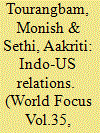

|
|
|
|
|
| Summary/Abstract |
The recent visit of India’s Prime Minister Narendra Modi provided a good platform to refresh the India-US relationship that had experienced serious policy drift from both the sides. The hopes pinned on India’s new Prime Minister Narendra Modi and his emphasis on reenergizing India’s growth curve has certainly lend a new lease of life to India-US relationship. Many commentaries on both sides have complained regarding the lack of game changers in the relationship.
|
|
|
|
|
|
|
|
|
|
|
|
|
|
|
|
| 18 |
ID:
135068


|
|
|
|
|
| Summary/Abstract |
Purpose—This article investigates how international cooperation and structural changes in the Northeast Asian logistics market can effect economic and political change in North Korea. Design/methodology/approach—The authors survey the historical background of Russia and China in the northern economic bloc, examine the current status of the northern logistics market in Russia, China, and North Korea, and analyze the structural changes of the northern logistics market in the areas of multimodal services, railway networks, and the northern sea route. Findings—— international cooperation and structural changes in the northern logistics network system will foster economic growth, reform, and opening—up in North Korea, with the prospect of economic prosperity and political stability in the Northeast Asian region.
|
|
|
|
|
|
|
|
|
|
|
|
|
|
|
|
| 19 |
ID:
136618
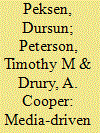

|
|
|
|
|
| Summary/Abstract |
Despite significant research on the role that media coverage of human suffering has on foreign policymaking, no study to date has examined the news media's impact on the use of economic sanctions, a widely used policy tool to address humanitarian problems. This study explores whether news media coverage of human rights abuses in Newsweek and the New York Times increases the likelihood of US economic sanctions. Synthesizing insights from agenda-setting theory with recent work on the domestic origins of sanction policy, we argue that press attention to human rights violations increases the threat and imposition of sanctions by mobilizing the public to pressure leaders to take action against abusive regimes. We find support for this argument in statistical tests of US sanction cases between the 1976 and 2000 period. The results also indicate that the media's effect is conditioned by US strategic ties to potential targets: the effect of critical press coverage is stronger for US non-allies than allies. Further, this conditional effect occurs even though abusive allies receive more media attention than abusive non-allies. Overall, this manuscript shows that nonstate actors can have an important role on foreign policy decision making generally, and specifically that news media influence the US decision to use economic sanctions. Our analyses also suggest that leaders balance the public's demand for action with the security imperative to maintain good relations with allies.
|
|
|
|
|
|
|
|
|
|
|
|
|
|
|
|
| 20 |
ID:
136133


|
|
|
|
|
| Summary/Abstract |
Today even raising the question of an economic integration agreement between the European Union and the Eurasian Economic Union seems a non-starter. Recent economic sanctions have severely hurt economic cooperation between the two political entities. Yet the foundations of any new institution are frequently set out in times of crisis.
|
|
|
|
|
|
|
|
|
|
|
|
|
|
|
|
|
|
|
|
|